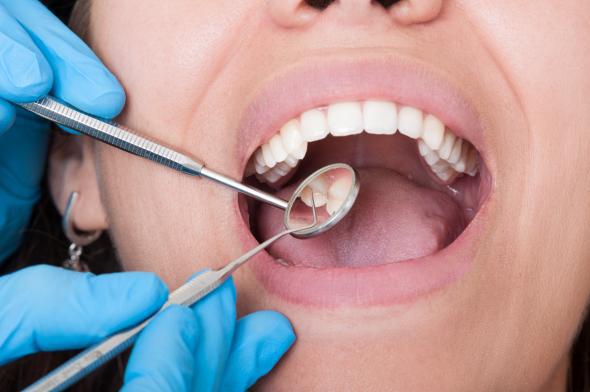According to some dentists and hygienists, routine appointments should be more than an opportunity for garbled chit-chat. Stat reported this week on an “activist group” of dental professionals who are urging their colleagues to use appointments as a chance to screen patients for signs of domestic violence. Dentists, they point out, typically see patients for cleanings twice a year, more often than the recommendation for medical checkups. Studies of domestic violence victims have found that the overwhelming majority suffer injuries on their head, neck, or face, where dentists can observe them. Horribly, signs of sexual abuse in children are often present in the mouth.
The efforts are being led by a Maryland-based organization called PANDA, which stands for “prevent abuse and neglect through dental awareness.” As of 2015, Maryland dentists who want to renew their licenses must receive two hours of training on abuse and neglect. PANDA says dental organizations in Pennsylvania, North Carolina, South Carolina, and Tennessee have looked into instituting similar requirements. Meanwhile, some dental schools now also train students to recognize signs of abuse. At Tufts, for example, students are taught to look for obvious signs like visible bruises, but also more subtle things such as patients who miss appointments, are jumpy or anxious in in the chair, or are accompanied by someone who never leaves their side. Tufts also has a program called Dental Outreach to Survivors that offers free and confidential care to victims in shelters.
Medical doctors have long been seen as uniquely positioned to spot signs of domestic abuse: They meet with patients privately, observe physical injuries, and have the standing to ask personal questions. As a result, many general practitioners now screen for intimate-partner violence along with posing questions about alcohol and smoking. But the effectiveness of domestic-violence screening has been debated within medical circles since the practice started becoming widespread. A 2014 analysis published in The BMJ found no evidence that screening increased referrals to domestic-violence support services or decreased experiences of violence. “The emphasis on how to identify victims distracts attention from the real issues,” one of the study’s authors told NPR at the time. Rather than spending time identifying victims, he said, the medical community should focus on connecting known victims with resources.
Whether or not mandatory formal screenings in the dental chair makes sense, however, it can’t hurt for dentists to be attuned to signs of abuse, and be prepared to point their patients to local support services. “A lot of dentists say, ‘I only do teeth,’” hygienist Sue Camardese, who runs PANDA, told Stat. “But this is health. This is part of health.”
